Reformist Mostafa Kavakebian Makes Another Bid for Iran’s Presidency
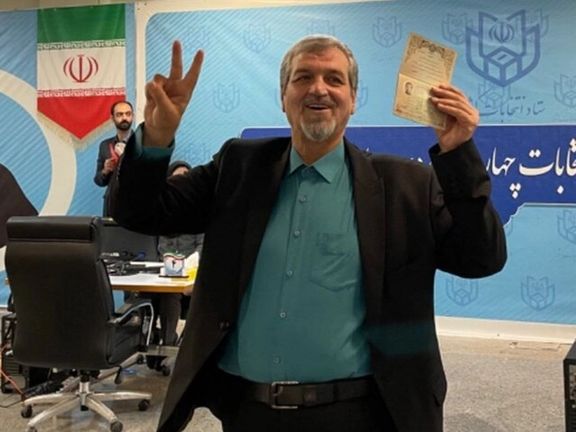
Mostafa Kavakebian, a reformist politician, has once again stepped into the fray by registering for the upcoming presidential election scheduled for June 28.

Mostafa Kavakebian, a reformist politician, has once again stepped into the fray by registering for the upcoming presidential election scheduled for June 28.
Kavakebian, 61, the Secretary General of the Democracy Party and editor-in-chief of the Mardomsalari newspaper, has faced numerous setbacks in his political career, including being disqualified by the conservative Guardian Council in 2005, 2013, 2017, and 2021 Presidential elections.
His political career includes serving as a representative in the Iranian Parliament for Tehran from 2016 to 2020, and earlier for Semnan and Mehdishahr from 2008 to 2012.
Meanwhile, an advisor to former interior minister Mostafa Pour-Mohammadi said Thursday that he too is going to register for the presidential election. Pour-Mohammadi, who served as minister of justice from 2013 to 2017, has been a controversial figure, particularly noted for his justification of the 1988 mass killings of political prisoners as fulfilling divine commandments.
Estimates indicate that between 4,500 and 10,000 prisoners were executed when the clerical rulers chose to eliminate those they considered oppositional.
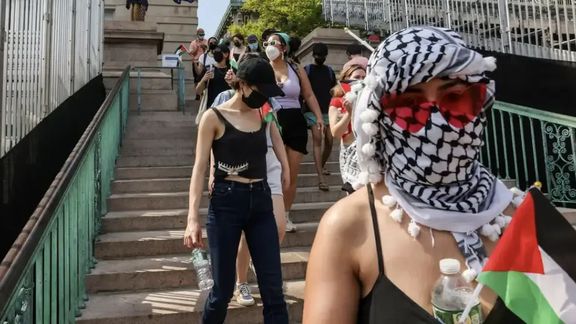
Iran's supreme leader has praised the pro-Palestine students, branding them part of Iran's 'resistance front' against the US and Israel.
“Dear university students in the United States of America, you are standing on the right side of history. You have now formed a branch of the Resistance Front and have begun an honorable struggle in the face of your government's ruthless pressure - which openly supports Zionists,” read a letter by Ali Khamenei.
The letter, dated May 25 and published on Khamenei's website on Thursday, predicts a "different fate awaits the important region of West Asia,” branding the students part of the “resistance front”, the group of militias Iran sponsors across the Middle East.
“The ‘resistance front,” the letter added, “rose amid this dark and bleak atmosphere, and the formation of ‘the Islamic Republic’ in Iran contributed to its expansion and strength.”
Thousands of students have taken to the streets and set up encampments at their campuses to protest against Israel which is in the midst of a war against Iran-backed Hamas in Gaza. Sparked by the Hamas invasion of October 7, in which 1,200 mostly civilians were killed, the retaliation has seen over 35,000 Palestinians killed according to Hamas. It has seen Israel accused of genocide as it continues its war aimed at annihilating Hamas and rescuing the remaining 125 hostages in Gaza. The US has defended Israel’s right to defend itself and continues to arm the world’s only Jewish state.
Khamenei added that the US administration had been providing the regime with continual political, economic, and arms support. “The American administration and its partners have not even as much as frowned upon this state terrorism and incessant oppression,” the letter read.
The letter sparked responses from across the political spectrum. US House Speaker Mike Johnson said: "When you’ve won the Ayatollah, you’ve lost America.”
Pro-Palestinian student protests in the US have been providing media fodder for the Islamic Republic as it continues to bet on political trouble overseas to make up for lost legitimacy at home.
Khamenei and his loyalists in the Iranian regime have seen victory in pro-Hamas protests in American universities, and the Supreme Leader on several occasions made sure to highlight this.
“Despite the extensive efforts of Zionists and their American and European supporters, the issue of Gaza remains the top global concern. Protests against the crimes of the Zionist regime in American universities and their expansion to European universities are signs of the continued sensitivity of public opinion worldwide to the Gaza issue,” Iran’s ruler said earlier in May.
A pro-government ideologue has expressed hope that the Islamic Republic can use the potential of pro-Palestinian protesting students at US campuses to form a new proxy group in America.
“I think the potential to repeat in the US what the Islamic Republic did in Lebanon is much higher. Our Hezbollah-style base in the US is much larger than what we have in Lebanon,” said University of Tehran professor Foad Izadi in an interview with Iran’s state TV in early May.
Khamenei has invested 35 years of his rule to relentlessly campaign against Israel, the United States and Western influence, not only in the Middle East but also in distant places in Africa and Latin America.
With heavy political and military investment on Hamas and other militant groups in the region, Khamenei seems desperate to showcase any sign of anti-Israeli and anti-Western public opinion at home and abroad as a sign of vindication for his worldview.
“The brutal and merciless behavior of the rabid Zionist dog proved the righteousness of the Islamic Republic's position and the Iranian people, and the massacre of thirty-some thousand people, half of whom are women and children, demonstrated the evil nature of the Zionist regime and the perpetual righteousness of Iran to the whole world,” according to Khamenei.
While Khamenei praises the protesters, Iran continues to quash dissent with hundreds of Iranians killed since 2022’s Women, Life, Freedom uprising and tens of thousands imprisoned.
Khamenei feels insecure after years of anti-regime protests by ordinary Iranians, whose social freedoms are being curtailed by Islamic restrictions and their economic status degraded by high inflation and lack of real jobs.
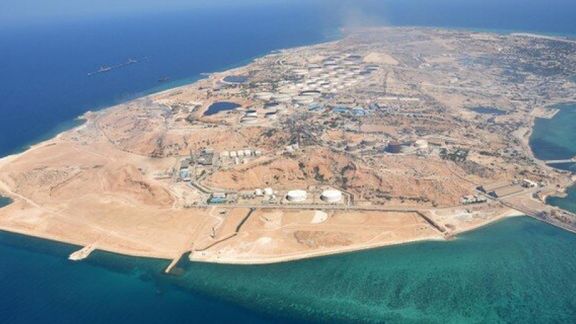
China may not support the territorial claims by the United Arab Emirates against Iran during a conference underway with Arab states in Beijing, Iran International has learned.
The UAE has laid claim to three small islands in the Persian Gulf that Iran took control of in 1971 after the United Kingdom withdrew from the Persian Gulf and the UAE was formed. Other Arab states formally support the territorial claim.
The China-Arab States Cooperation Forum opened in Beijing on Thursday with President XI Jinping speech. The Forum was established in 2004 as a formal dialogue mechanism between China and Arab states. China is seeking to strengthen its relations with Arab states as a model for maintaining world peace and stability, Xi was quoted as saying by state media at the gathering.
The summit is attended by heads of state from Egypt, the United Arab Emirates, Bahrain and Tunisia among others.
A diplomatic source close to the UAE-China negotiations told Iran International that Beijing has decided not to support the UAE's claim of ownership over the islands of Abu Musa, Greater Tunb, and Lesser Tunb at this meeting.
In exchange for this action, the Islamic Republic has promised to disrupt the development of the "International North-South Transport Corridor" (INSTC) project to slow down its progress.
The International North-South Transport Corridor is a strategic Russian-Indian-Iranian project that aims to connect the Caspian Sea to the Persian Gulf and the Indian Ocean.
This project was launched in 2000 with an agreement between Moscow, Tehran, and New Delhi in Saint Petersburg, and subsequently, 11 other countries, including Azerbaijan, Armenia, Kazakhstan, Kyrgyzstan, Tajikistan, Turkey, Oman, Ukraine, and Belarus, joined. Bulgaria is also participating as an observer.
The International North-South Transport Corridor is considered a competitor to China’s “Belt and Road Initiative.”
The Belt and Road Initiative is a plan presented by China's President in 2013 to enhance economic cooperation between China and the international community. Based on the "Silk Road," this initiative plays a key role in Beijing's foreign policy.
On the other hand, the International North-South Transport Corridor is of great importance to Moscow. However, progress on this project has been delayed due to increasing pressure from Beijing on Tehran.
According to information received by Iran International, on the eve of the Arab-Chinese meeting, Beijing sent confidential messages to Tehran, stating that it is willing to refrain from recognizing the UAE's position on the sovereignty of the three islands in exchange for disruptions in the development of the North-South Corridor project.
Based on this information, China expects the Islamic Republic to take practical steps, such as interfering with the planning of the Iranian section of the North-South Corridor and delaying the financing of the project to postpone its implementation.
Last July, Russia sided with the UAE on the issue of the three islands, signing a communique in a conference with the Gulf Cooperation Council, comprising six Arab states. Iran protested Moscow’s move but has remained dependent on its alliance with Russia.
In the joint statement from the Russia-Arab countries meeting held on December 20, 2023, in Morocco, Russia once again supported Abu Dhabi's position on the three islands of Greater Tunb, Lesser Tunb, and Abu Musa was once again supported.
Sergey Lavrov, Russia's Foreign Minister, represented Moscow at this meeting.
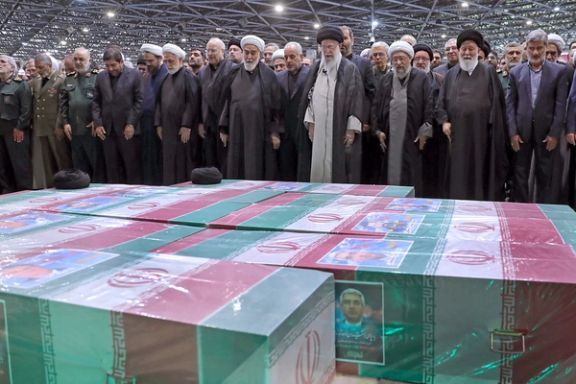
The United States will boycott a United Nations tribute on Thursday to Iranian President Ebrahim Raisi, who was killed earlier this month in a helicopter crash, a US official told Reuters.
The 193-member UN General Assembly traditionally meets to pay tribute to any world leader who was a sitting head of state at the time of their death. The tribute will feature speeches about Raisi.
"We won't attend this event in any capacity," a US official, speaking on condition of anonymity, told Reuters. The US boycott has not previously been reported.
Iran's mission to the United Nations in New York declined to comment to Reuters.
Raisi, a hardliner who had been seen as a potential successor to Supreme Leader Ayatollah Ali Khamenei, was killed when his helicopter came down in mountains near the Azerbaijan border on May 19.
"The United Nations should be standing with the people of Iran, not memorializing their decades-long oppressor," said the US official in a sharp reversal of earlier policy. "Raisi was involved in numerous, horrific human rights abuses, including the extrajudicial killings of thousands of political prisoners in 1988."
"Some of the worst human rights abuses on record, especially against the women and girls of Iran, took place during his tenure," the official said.
The UN Security Council stood at the beginning of an unrelated meeting for a moment of silence on May 20 to remember the victims of the helicopter crash. Deputy US Ambassador to the UN Robert Wood reluctantly stood with his 14 counterparts.
This led to sharp criticism of the Biden administration by several Republican lawmakers and many Iranian-Americans, who argued that Raisi was deeply involved in killings and repression of opponents throughout his career as a regime official. In 1988 alone, Raisi was part of a “Death Committee” that ordered the summary executions of 3000-5000 political prisoners serving their jail terms. Families of some of these victims and other government atrocities with Raisi’s involvement are US citizens.
The United States expressed its "official condolences" for Raisi's death, the State Department said on May 20. White House national security spokesperson John Kirby also said that day: "No question this was a man who had a lot of blood on his hands."
Raisi, 63, was elected president in 2021 and in office ordered a tightening of morality laws, oversaw a bloody crackdown on anti-government protests and pushed hard in nuclear talks with world powers.
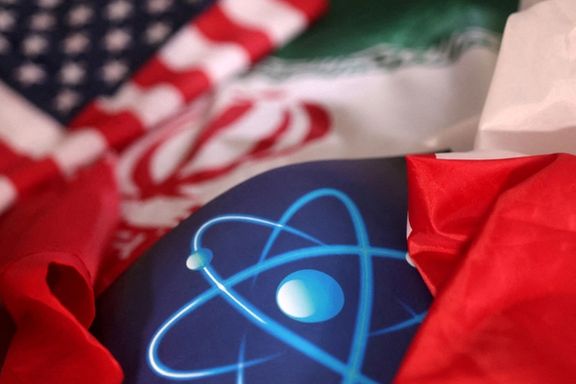
The United States is fully coordinating with its European allies to contain Iran’s nuclear program, a US official told Iran International on Wednesday.
This comes two days after Wall Street Journal reported that the Biden administration was pressing Britain, France and Germany to back off plans to rebuke Iran for nuclear advances.
The US official told Iran International that Washington has kept the three European allies, also known as the E3, informed on its interactions with the International Atomic Energy Agency (IAEA) and on matters related to keeping pressure on Iran. Any allegation that the US is keeping its allies apprised, they said, is false.
In an email statement to Iran International, the US official said “we are increasing pressure on Iran through sanctions and international isolation as seen most recently in the coordinated G7 measures taken in the wake of Iran’s attack against Israel last month. No decisions have been taken with respect to the upcoming BOG," referring to the IAEA's Board of Governors' meeting from June 3 to 7.
"Any speculation about decisions is premature,” the official added.
Last week, Reuters reported that the US and European allies were at odds over how to deal with Iran: to confront or not?
On Wednesday Reuters reported that Britain, France and Germany have circulated a draft resolution against Iran ahead of next week's board meeting with the UN nuclear watchdog, according to Reuters.
The tensions come on the heels of a confidential IAEA report, viewed by Iran International and several other media outlets on Monday, that warned Iran is continuing to enrich uranium to near weapons-grade levels.
According to the report, as of May 11, Iran has 142.1 kilograms of uranium enriched up to 60 percent which is an increase of 20.6 kilograms since that last report by the UN watchdog in February.
That means Iran's estimated stockpile of enriched uranium had reached more than 30 times the limit set out in the 2015 nuclear agreement between Tehran and world powers.
Iran insists that its nuclear program is for peaceful purposes.
A "Dangerous" Situation
Behnam Ben Taleblu, a senior fellow at the Foundation for Defense of Democracies (FDD), told Iran International, the US and its European allies are not on the same page when it comes to Iran - and that poses risks.
"This is a dangerous situation. When the US and its allies cannot be in the same sheet of music because they don't share the same assessment of the threat and what to do about it."
US officials told Iran International on Wednesday: “We remain tightly coordinated with our E3 partners.”
Wall Street Journal reported that France and Britain were concerned that Washington lacks a strategy for dealing with Iran’s nuclear advances and European diplomats have said that the Biden administration appears unwilling to either pursue a serious diplomatic effort with Iran or take punitive actions against Tehran’s nuclear transgressions.
British and French officials have told Washington they want to press ahead with a censure resolution, saying it was time to draw a line, according to Wall Street Journal.
However, the US officials believe it is still too early to make a final decision on the tactics to contain Iran before the BOG.
The Biden administration also agrees with Europeans on the need to increase pressure on Iran, the US officials said, however, the US has proposed other options, including cutting off Iranian banks still operating in Europe and to enlist the Islamic Revolutionary Guard Corps (IRGC) as a terrorist entity as the US did in 2019 under the Trump administration.
In Ben Taleblu’s view the fact that there has not been a resolution of censure for more than a year now demonstrates the point of the Wall Street Journal article.
"So whether the Europeans use the word lobbying or the Americans deny based on how loaded this word is, the proof is really in the pudding," Ben Taleblu said.
After the US pulled out of the 2015 Iran nuclear deal, the IAEA has not been allowed to access certain facilities, including centrifuge workshops since 2021.
US officials said they want to raise the costs for Iran for its lack of cooperation.
IAEA Director General Rafael Mariano Grossi hasn't updated the Board on the outcome of its recent engagements with Iran. The US government believes pre-determining an outcome would be counter-productive.
Grossi said last week the IAEA was planning to continue technical discussions with Iran but they had not yet taken place due to last weekend's helicopter crash that killed President Ebrahim Raisi and Foreign Minister Hossein Amir-Abdollahian.
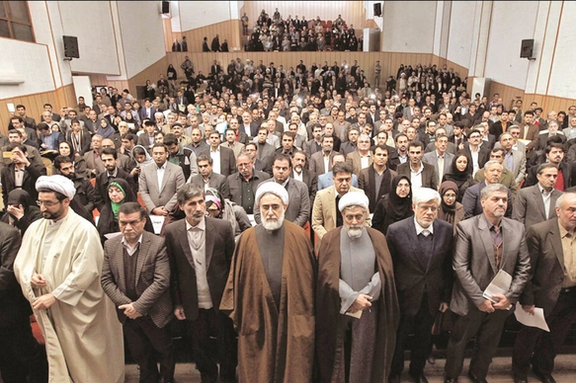
Iran's 'reformists' have indicated that they are willing to participate in the snap presidential elections of June 28, provided that the ruling establishment allows them to field their own candidates.
Azar Mansouri, the current head of the Reforms Front and secretary general of the Union of Islamic Iran People’s Party (Etehad-e Mellat-e Iran-e Eslami), indicated in a tweet on Tuesday that reformists are expecting clear signals from the authorities that the elections will be fair, free, competitive, meaningful, and effective. She added that is important to see if the “dominant will”, apparently referring to Supreme Leader Ali Khamenei, wishes “maximal participation” in the upcoming elections.
As Khamenei’s hardliner loyalists have barred others from competing in the last three national elections, voters have turned away from ballot boxes. Turnout has dropped to below 40 percent according to non-official estimates.
Reformists including former President Mohammad Khatami refused to vote in the March 1 elections of the Parliament and Assembly of Experts.
For the first time in his political career, Khatami not only refrained from voting in the parliament and Assembly of Experts elections, despite Supreme Leader Ali Khamenei's repeated declarations that voting is a religious duty, but also defended his decision in solidarity with the majority of Iranians who are angry with the country's governance, in a speech to his advisors on March 6.
In the past few days, however, there have been indications that reformists are seriously considering a return to the ballot boxes if given adequate guarantees that their participation will not serve the ruling establishment and “heat the election oven” to “bake someone else’s bread”.
‘Reformists’ appear determined not to support any candidate outside their own camp in this election, unlike in 2013 and 2017 when they rallied around moderate conservative Hassan Rouhani.
In an editorial in the reformist Etemad newspaper Tuesday, prominent Reformist commentator Abbas Abdi maintained that the populace may be willing to vote again, after shunning the ballot in the past three elections, provided that they are given “a certain level of meaningful choice”.
Ali Shakouri-Rad, the former secretary general of the Etehad-e Mellat Party, has also said that his party has decided to encourage people to participate in the elections provided that a candidate endorsed by the Reforms Front, the umbrella ‘reformist’ coalition, is allowed to run.
Shakouri-Rad who represents his influential party in the Reforms Front said his party has endorsed Mohammad Sadr and Mohammadreza Zafarghandi as potential candidates to the reformists decision-making body.
Sadr, 73, is a nephew of the late Iranian-Lebanese Shia politician Musa al-Sadr and a diplomat. He was appointed as a member of the Expediency Council by Khamenei in 2017 and was reinstated by him in 2022.
Sadr was one of the founding members of the Islamic Iranian Participation Party (IIPF) before 2009 and one of the most vocal critics of President Mahmoud Ahmadinejad’s foreign policy.
Sadr said Tuesday that the leader of the Reforms Front, former President Khatami, suggested to him to run but he has not yet made a decision.
Mohammadreza Zafarghandi, a former secretary-general of the non-profit Iran Medical Council, has been a vocal critic of hardliners and Ebrahim Raisi’s government. Zafarghandi is also one of the veteran members of the Islamic Association of the Iranian Medical Community. The association is part of the Reforms Front.
Since Tuesday, several figures including the ultra-hardliner Mayor of Tehran, Alireza Zakani, former President Akbar Hashemi-Rafsanjani’s son Mohsen Hashemi who is a member of the centrist Servants of Construction (Kargozaran) Party have denied an intention to run.
However, Mehrdad Bazrpash, 45, a hardliner who once served as a member of populist Mahmoud Ahmadinejad’s “young advisers” during his tenure as mayor of Tehran, was named by Meysam Nadi, head of the election headquarters of the Strategic Network of Friends of the Islamic Revolution (Sharyaan), as one of the group’s “principal options”.
Iranian media such as Borna News claim Ali-Akbar Salehi, Iran's foreign minister under Mahmoud Ahmadinejad and nuclear chief under Hassan Rouhani, has also indicated his interest in running for the presidency, although he will be over the maximum age (75) allowed by law to run by two months.